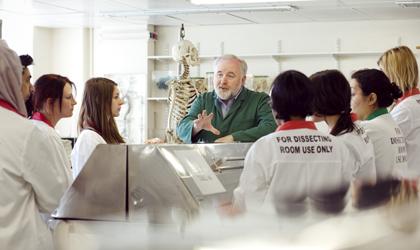One of the questions we often get asked is whether our M.Ost course includes dissection. At the UCO, we offer prosection rather than dissection (see below for the difference between the two), and all M.Ost students get the opportunity to attend a prosection session during their first year to support their learning.
What is dissection/prosection and what is the difference?
In our context, dissection typically involves self-directed learning through the preparation of cadavers. Prosection involves guided tutorials of prepared anatomical specimens of specific regions and structures.
Why does the UCO offer prosection over dissection?
We offer prosection as it allows us to focus on the structures and conditions that are more commonly seen in osteopathic practice. Prosection also allows us to tailor our tutorials to needs of the class.
What is the benefit of dissection/prosection to my studies?
Anatomy is a challenging but extremely interesting subject, prosection allows our students to better understand the integrated nature of the human body. Prosection allows students to see beyond the books, apps, and websites to what the human body is really like. This experience helps to create a foundation of knowledge that will last a career.
Where does it take place?
Our prosection sessions are at the prestigious and modern anatomy lab at Kings College (Guys Campus). We benefit from having renowned anatomist guide our students through live demonstrations and tutorials.
I'm squeamish/have a moral/religious objection - do I need to take part?
This is a common concern among those new to dissection/prosection. Visits to the anatomy lab are always optional and students may leave or take breaks at any time during the visit. We also offer extra study support to those who would prefer not to take part in the sessions.
If you have any more questions or concerns about prosection at the UCO please feel free to contact our admissions team who will pass your enquiry on to a member of teaching staff.
Image: copyright of Kings College

